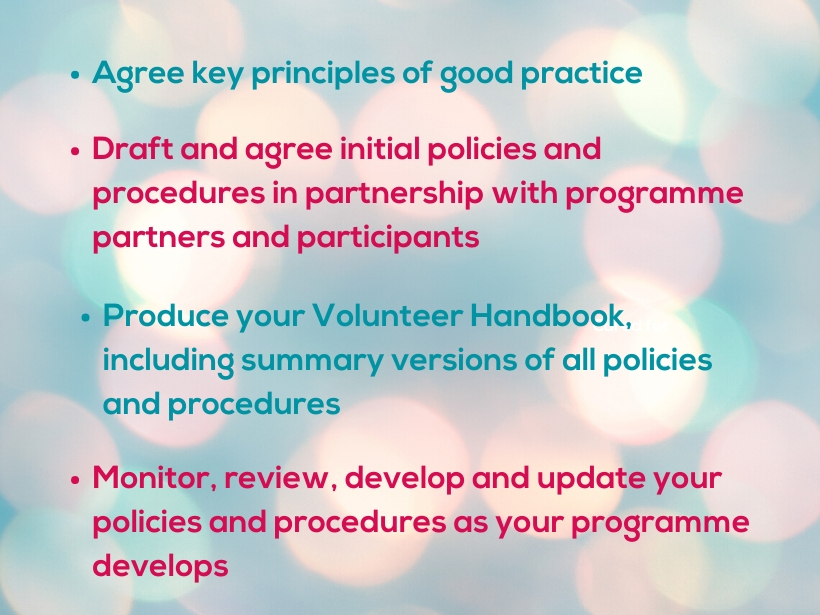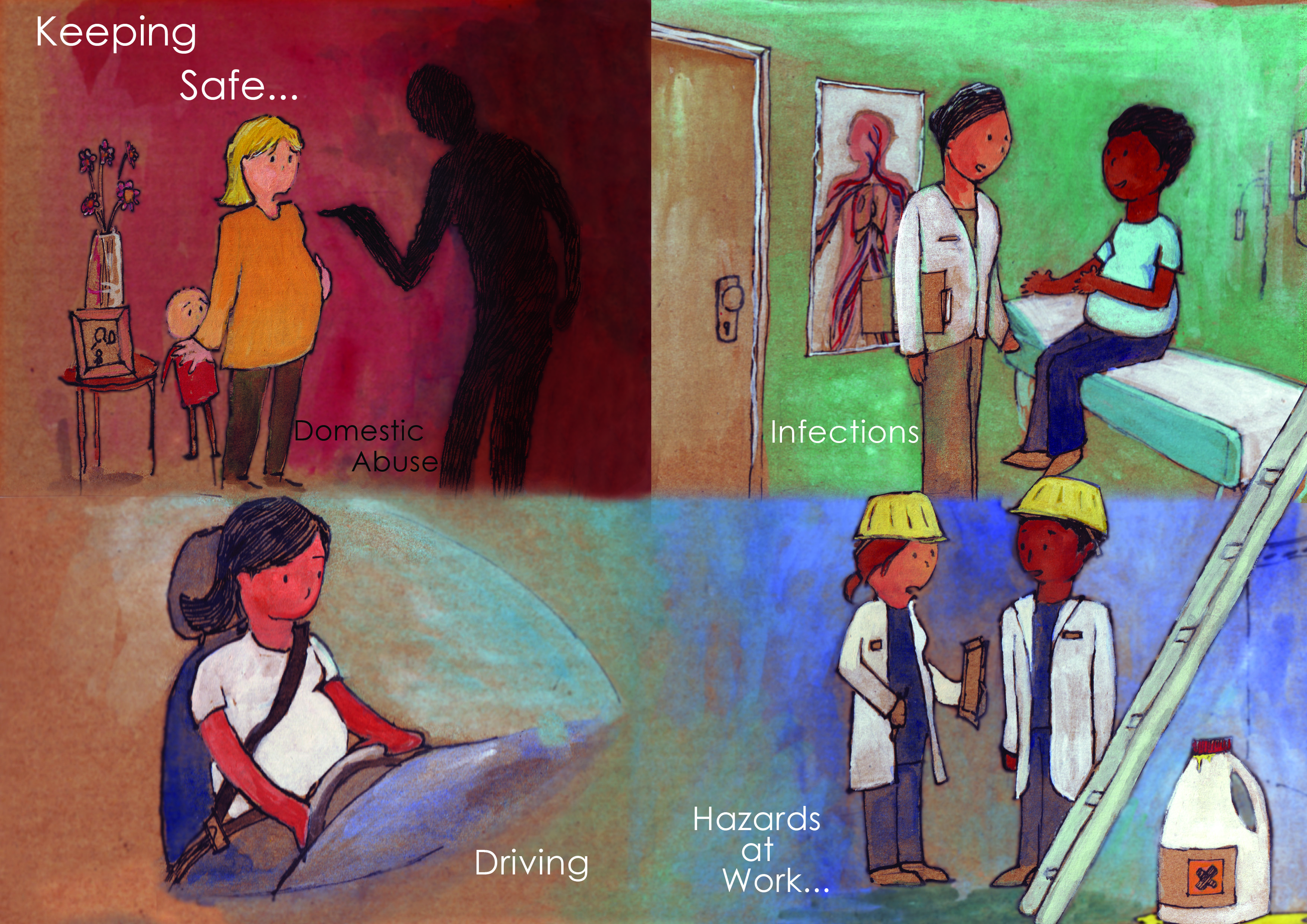As well as clearly articulating the roles and responsibilities of programme volunteers, strong policies and procedures help to protect the wellbeing of the parents and families they support.
Set the framework:

- An over-arching volunteering policy sets the framework for your volunteer programme and reflects your organisation’s commitment to its volunteers. It clarifies the role of volunteers within the organisation and what they can expect – including supervision, training, support, inclusion and involvement. This will help volunteers feel confident, valued, safe and effective in their role.
- Clear boundaries and ground rules from the outset are vital for the safety of everyone participating in the programme, including parents. This means volunteers have a clear understanding of the boundaries of support, health and safety, limits of confidentiality and what action to take if there are concerns around safeguarding.
- Effective policies and procedures are good practice. We have the IiV kite mark for our volunteer Community Parent Programmes in Essex, the Isle of Dogs and Derby. Read more about this, and the Perinatal Peer Support Principles , in our Manual Guide: Policies and Procedures (downloadable below) .
NCVO provides excellent guidance about volunteer policies and procedures: click here.
Manual Guide: Policies and procedures
Added 13/05/2025Please sign in to download this file.
You have a duty of care to protect the wellbeing and safety of local families and volunteers. This means you have a statutory responsibility not to harm or damage their health and safety through their involvement with the programme.
You can do this by:
- Providing appropriate information, support, supervision and training to volunteers
- Repeating training so volunteers refresh their knowledge and keep up-to-date
- Including health and safety as part of the induction process (volunteers are entitled to the same health and safety requirements as paid employees)
- Having clear expectations on induction, training and supervision in your Volunteer Handbook
- Demonstrating and recording how you prepare and support volunteers to carry out their role safely and competently.
An example of risk management
If you recruit volunteers who have experienced mental health issues, you need to be more vigilant and put specific safety nets in place to prevent a relapse due to carrying out the volunteering role. Read some recommended risk management processes in our Manual Guide: Policies and Procedures.
Volunteer Handbook
Added 05/01/2026Please sign in to download this file.
Manual Guide: Policies and Procedures
Added 13/05/2025Please sign in to download this file.
Our Manual Guide: Policies and Procedures has a comprehensive table outlining the policies you need, the procedures that embed them, and key resources.
Key policies include:

- Safeguarding vulnerable adults
- Safeguarding children
- Volunteer supervision
- Equality and diversity
- Health and safety
- Lone working
- Comments, compliments and complaints
- Confidentiality and data protection
- Protecting against infectious diseases
- Use of mobile phones.
Policies and procedures need to be sensitive to local community needs and adjusted according to what works in the local area. It’s important to review them regularly and update them in line with current legislation and local procedures, as well as listening to the views of volunteers, parents and partners as the programme develops.
Manual Guide: Policies and Procedures
Added 13/05/2025Please sign in to download this file.
To make sure policies and procedures are accessible, straightforward and put into practice:
- Avoid making them too formal
- Write shortened versions of each policy specifically for volunteers
- Refer to them as ‘ground rules and boundaries’

- Explain the meaning and content during induction (using informal quizzes), ongoing training and supervision
- Make sure detailed guidance about each policy is readily available in the Volunteer Handbook
- Summarise all safeguarding policies and procedures in a simple flow chart in your Volunteer Handbook, to make them crystal clear
- Make sure the programme coordinator takes responsibility for ensuring volunteers can relate policies to their day-to-day role (Read more about this in the Manual Guide: Policies and Procedures)
- See that the local programme delivery team offers strong leadership and guidance, and that they reinforce policies and procedures as part of day-to-day programme delivery
Volunteer Handbook
Added 05/01/2026Please sign in to download this file.
Manual Guide: Policies and Procedures
Added 16/06/2025Please sign in to download this file.
Volunteers may face risks of personal injury, liability for accidents, loss of property and damage to property. Your organisation could be held liable if a volunteer acts improperly or incompetently as a result of activities that are ‘authorised’ by the programme. It’s vital to have the correct insurance, so you will need to get advice to cover your needs e.g. public liability, professional indemnity and personal accident insurance. If volunteers use their vehicle for volunteering you will need evidence confirming business cover.
Read more in the Manual Guide: Policies and Procedures.
Manual Guide: Policies and Procedures
Added 13/05/2025Please sign in to download this file.
Volunteers are entitled to full reimbursement of any reasonable expenses incurred through their volunteering. Failure to do this has equal opportunities implications. All volunteers should be informed about how to claim expenses, so no-one is disadvantaged.
This is an important resource for every volunteer to use during training, induction and the ongoing supervision process. It contains all the key information that each volunteer needs to know, is easy reference and will help volunteers to feel valued and proud of your organisation.
For more information read our Manual Guide: Policies and Procedures or our sample Volunteer Handbook.
Manual Guide: Policies and Procedures
Added 13/05/2025Please sign in to download this file.
Volunteer Handbook
Added 05/01/2026Please sign in to download this file.

